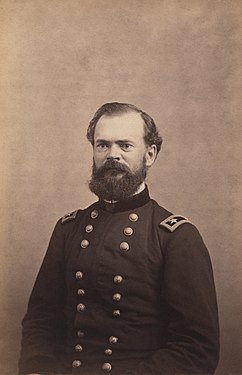Wikipedia:Wikipedia Signpost/2022-08-01/Featured content
A little list with surprisingly few lists
Here we are again, and this time I'm actually doing all the work and not just leaving it for someone else to do. I'm so disappointed in myself. Good month for featured pictures and articles, but an awful month for lists – only two, which I'm told is the worst month for lists ever. Luckily, July is already doing much better. Meanwhile, featured topics are usually quite rare (as one would expect, given they're an entire subject matter's worth of featured articles, so having two featured topics is actually very good.
It's not really a coincidence that The Cenotaph appears both in Featured Articles and Featured Pictures, because I like searching the featured article candidates for good-quality images to restore or nominate. Same with James B. McPherson, who was the commander of the new Featured Article, Battle of Raymond. If you see images in prospective or existing featured articles you think might be of featured picture quality, by all means either tell me or nominate them yourself. I've always thought Featured Articles deserve Featured Pictures in them when possible.
Speaking of Featured Pictures, we could probably use a bit more participation there – but, then, I do have a thirteen-image nomination backlog, so that might be a rather self-serving invite.
Featured articles
Seventeen featured articles were promoted this period.

- Cedar Hill Yard, nominated by Trainsandotherthings
- Cedar Hill Yard is a classification yard located in New Haven, North Haven, and Hamden, Connecticut. It was built by the New York, New Haven and Hartford Railroad (known simply as The New Haven) in the early 1890s in and around New Haven's Cedar Hill neighborhood, which gave the yard its name. Electrical catenary for electric locomotives was added to the yard in 1914. To handle increasing traffic as a result of World War I, the yard was greatly expanded between 1917 and 1920 with additional construction along both sides of the Quinnipiac River. The yard was further modernized in the 1920s, becoming one of the busiest railroad yards in the United States, and the most important yard in the entire New Haven Railroad system. At its peak during World War II, Cedar Hill Yard handled more than 5,000 railroad cars per day. However, following the end of the war, the yard's importance began to decline as freight traffic across New England shifted to road transport, and heavy industry left the region. Much of the yard began to fall into decay following the New Haven Railroad's bankruptcy in 1961. In 1999, it was purchased by CSX Transportation and began expanding once more. Amtrak now uses part of the yard as a base for maintenance of way operations on the Northeast Corridor, while two other freight railroads also operate freight trains to and from the yard including the Providence and Worcester Railroad and Connecticut Southern Railroad. Cedar Hill Yard remains the largest classification yard in Connecticut as of 2022 despite its diminished size.
- Herman the Archdeacon, nominated by Dudley Miles
- Herman the Archdeacon (born before 1040, died 1090s) was a member of the household of Herfast, Bishop of East Anglia, in the 1070s and 1080s, and then a monk of Bury St Edmunds Abbey in Suffolk for the rest of his life. Herman was probably born in Germany. Around 1070 he entered Herfast's household, and according to a later source he became the bishop's archdeacon, which was at that time an important secretarial position. He assisted Herfast in his unsuccessful campaign to move his bishopric to Bury St Edmunds Abbey, against the opposition of its abbot, and helped to bring about a temporary reconciliation between the two men. He remained with the bishop until his death in 1084, but he later regretted supporting his campaign to move the bishopric and himself moved to the abbey by 1092.
- Herman was a colourful character and a theatrical preacher, but he is chiefly known as an able scholar who wrote the Miracles of St Edmund, a hagiographical account of miracles believed to have been performed by Edmund, King of East Anglia after his death at the hand of a Danish Viking army in 869. Herman's account also covered the history of the eponymous abbey.
- The Cenotaph, nominated by HJ Mitchell
- The Cenotaph is a 1920 war memorial on Whitehall in London, England designed by Sir Edwin Lutyens as the United Kingdom's national memorial to the British and Commonwealth dead of the First World War. It has since come to represent British casualties from later conflicts. A cenotaph is an empty tomb: during the First World War, most of the dead were buried close to where they fell; thus, the Cenotaph symbolises their absence and is a focal point for public mourning.
- The original temporary Cenotaph was erected in 1919 for a parade celebrating the end of the First World War. Calls for the Cenotaph to be rebuilt in permanent form began almost immediately. After some debate, the government agreed and construction work began in May 1920. Lutyens added entasis (curvature) but otherwise made minimal design alterations. The memorial met with public acclaim and has largely been praised by academics, though some Christian organisations disapproved of its lack of overt religious symbolism. The National Service of Remembrance is held annually at the site on Remembrance Sunday; it is also the scene of other remembrance services.
- Enoch Fenwick, nominated by Ergo Sum
- Enoch Fenwick SJ (May 15, 1780 – November 25, 1827) was an American Catholic priest and Jesuit, who ministered throughout Maryland and became the president of Georgetown College. He studied at Georgetown College in Washington, D.C. Like his brother and future bishop, Benedict Joseph Fenwick, he entered the priesthood, studying at St. Mary's Seminary, before entering the Society of Jesus, which was suppressed at the time. He was made rector of St. Peter's Pro-Cathedral in Baltimore by Archbishop John Carroll and remained in the position for ten years. Near the end of his pastorate, he was also made vicar general of the Archdiocese of Baltimore, which involved traveling to say Mass in remote parishes throughout rural Maryland. In 1820, Fenwick reluctantly accepted his appointment as president of Georgetown College. While he made some improvements to the curriculum, his presidency was considered unsuccessful by contemporaries due to declining enrollment and mounting debt. In August 1825, he abandoned the presidency following a disagreement with the provincial superior. He died two years later.
- 1990–91 Gillingham F.C. season, nominated by ChrisTheDude
- During the 1990–91 English football season, Gillingham F.C. competed in the Football League Fourth Division, the fourth tier of the English football league system. It was the 59th season in which Gillingham competed in the Football League and the 41st since the club was voted back into the league in 1950. Early in the season, Ron Hillyard, the club's long-serving goalkeeper, ended his playing career with a club record number of appearances. Gillingham's form was inconsistent in the first half of the season; after falling to 17th in the league table, the team began a lengthy unbeaten run and were 10th at the end of 1990. Around the end of March, Peter Beadle and David Crown, two of the team's regular starting forwards, were injured and both missed most of the remainder of the season. The team went 10 consecutive games without winning between the last game of March and the first of May and finished the season 15th in the Fourth Division.

- Daglish railway station, nominated by Steelkamp
- Daglish railway station is a commuter railway station on the boundary of Daglish and Subiaco, suburbs of Perth, Western Australia. Opened on 14 July 1924, the station was named after Henry Daglish, who was a mayor of Subiaco, a member for the electoral district of Subiaco, and a premier of Western Australia in the 1900s. Daglish was a resident of Subiaco for 22 years before he died in 1920. The station consists of an island platform accessed by a pedestrian underpass. There are two small buildings on the platform which operated as a parcels office and ticket office up until 1970. The station is only partially accessible due to a steep access ramp and lack of tactile paving.
- Danzig Street shooting, nominated by Reidgreg
- The Danzig Street shooting was a Canadian gang-related shooting. It occurred on the evening of 16 July 2012 at a block party, which began as a children's barbecue at a social housing complex, on Danzig Street in the West Hill neighbourhood of Toronto. Rival gang members Folorunso Owusu, 17, and Nahom Tsegazab, 19, along with an unidentified third gunman, opened fire in a crowd of two hundred people. This resulted in the deaths of Joshua Yasay and Shyanne Charles, and the injury of twenty-four others (including two of the perpetrators), making it the worst mass shooting in Toronto. Although initially believed to be the resumption of a 2003 gang war between the Galloway Boys and the Malvern Crew, it later became clear that the Danzig Street shooting was not part of a territorial dispute or retaliation for another incident but a disagreement between teenagers who then had a gunfight at a party. Justice Ian Nordheimer said of the incident, "Ordinary persons do not understand how anyone, much less teenagers, can come not only to possess such weapons, but to use them in such a brutal and indifferent way."
- The incident, in conjunction with the Eaton Centre shooting six weeks earlier and a shooting in a Colorado movie theatre four days later, renewed debate on gun crime in urban areas.
- Strom Thurmond filibuster of the Civil Rights Act of 1957, nominated by AviationFreak
- On August 28, 1957, Strom Thurmond, a United States senator from South Carolina, began a filibuster intended to prevent the passage of the Civil Rights Act of 1957, which worked to make voting more accessible to African Americans. The filibuster, an extended speech designed to stall legislation, began at 8:54 p.m. and lasted until 9:12 p.m. the following day, a duration of 24 hours and 18 minutes. This made the filibuster the longest single-person filibuster in United States Senate history, a record that still stands as of 2022[update]. The filibuster focused primarily on asserting that the bill was both unnecessary and unconstitutional, and Thurmond read from several historical and legal documents. As a show of physical endurance, the filibuster also served to reinforce Southern ideas about white masculine strength and power. Despite the filibuster, the bill passed the Senate two hours after Thurmond's conclusion and was signed into law by President Dwight D. Eisenhower within two weeks.
- Battle of Raymond, nominated by Hog Farm
- The Battle of Raymond, part of the American Civil War, was fought on May 12, 1863, near Raymond, Mississippi, during attempts capture the strategically important Mississippi River city of Vicksburg. During this, a portion of Grant's army consisting of Major General James B. McPherson's 10,000 to 12,000-man XVII Corps moved northeast towards Raymond. In response, the Confederate commander of Vicksburg, Lieutenant General John C. Pemberton, ordered Brigadier General John Gregg to Raymond. Neither commander was aware of the strength of his opponent, and Gregg acted aggressively, thinking McPherson's force was small enough his men could easily defeat it. McPherson, in turn, overestimated Confederate strength and responded cautiously. After two brigades of Major General John A. Logan's division fought against the Confederate force, McPherson brought up Brigadier General John D. Stevenson's brigade and Brigadier General Marcellus M. Crocker's division, and Gregg decided to disengage after the Confederate line cracked. The battle at Raymond changed Grant's plans for the Vicksburg campaign, leading him to first focus on neutralizing the Confederate forces at Jackson before turning against Vicksburg, capturing it on July 4.

- Oscar Isaac, nominated by FrB.TG
- Óscar Isaac Hernández Estrada (born March 9, 1979) is an American actor. Known for his versatility, he has contributed to a change in the portrayal of Latinos in Hollywood. Isaac was named the best actor of his generation by Vanity Fair in 2017 and one of the 25 greatest actors of the 21st century by The New York Times in 2020. His accolades include a Golden Globe Award, a National Board of Review Award and an appearance on Time's list of one of the 100 most influential people in the world in 2016.
- His first major role was that of Joseph in the biblical drama The Nativity Story (2006) and he won an AACTA Award for Best Actor in a Supporting Role for portraying José Ramos-Horta in the Australian film Balibo (2009). After gaining recognition for playing supporting parts in Robin Hood (2010) and Drive (2011), Isaac had his breakthrough with the eponymous role of a singer in the musical drama Inside Llewyn Davis (2013), which earned him a Golden Globe nomination. Isaac's career progressed with leading roles in the crime drama A Most Violent Year (2014), the thriller Ex Machina (2015) and the superhero film X-Men: Apocalypse (2016). He became a global star with the role of Poe Dameron in the Star Wars sequel trilogy (2015–2019). Isaac starred in the historical drama Operation Finale (2018)—which marked his first venture into production—the science-fiction films Annihilation (2018) and Dune (2021), and the crime drama The Card Counter (2021).
- Battle of Lalakaon, nominated by Constantine
- The Battle of Lalakaon was fought in 863 between the Byzantine Empire and an invading Arab army in Paphlagonia (modern northern Turkey). The Byzantine army was led by Petronas, the uncle of Emperor Michael III, although Arab sources also mention the presence of the Emperor in person. The Arabs were led by the emir of Melitene (Malatya), Umar al-Aqta. Umar al-Aqta overcame initial Byzantine resistance to his invasion and reached the Black Sea. The Byzantines then mobilized their forces and encircled the Arab army near the Lalakaon river. The subsequent battle ended in a Byzantine victory and the emir's death on the field, and was followed by a successful Byzantine counteroffensive across the border. These victories were decisive; the main threats to the Byzantine borderlands were eliminated, and the era of Byzantine ascendancy in the East (culminating in the 10th-century conquests) began.
- 1998 FIFA World Cup Final, nominated by Amakuru
- The 1998 FIFA World Cup Final was the final match of the 1998 FIFA World Cup, the 16th edition of the quadrennial football competition organised by FIFA for the men's national teams of its member associations. The match was played at the Stade de France in Paris, France, on 12 July 1998 and was contested by Brazil and France. France took the lead shortly before the half-hour mark, when Zinedine Zidane outjumped Leonardo to connect with a header from an in-swinging corner from the right taken by Emmanuel Petit. Zidane scored again, with another header from a corner, shortly before half-time to give France a 2–0 lead. Petit then added a third goal in second-half injury time, striking the ball low into the net following a pass by Patrick Vieira, to complete a 3–0 win for France. France's win was their first World Cup title, as they became the seventh different nation to win the tournament. Zidane was named the man of the match, while Brazilian player Ronaldo was awarded the Golden Ball as FIFA's outstanding player of the tournament.
- "Out of the Woods", nominated by Ippantekina
- "Out of the Woods" is a song by American singer-songwriter Taylor Swift, taken from her fifth studio album, 1989 (2014). Swift wrote and produced the song with Jack Antonoff. With lyrics inspired by a failed relationship and the ensuing anxieties that Swift experienced, "Out of the Woods" is a synth-pop song with elements of indietronica and features heavy synthesizers, looping drums, and layered background vocals. Music critics praised "Out of the Woods" for its 1980s-influenced production and narrative lyrics offering emotional engagement. The song peaked at number 18 on the US Billboard Hot 100 and was certified platinum by the Recording Industry Association of America (RIAA). It also reached the top 20 of charts in Australia, Canada, and New Zealand.
- "Dear Future Husband", nominated by MaranoFan (NØ)
- "Dear Future Husband" is a song by American singer-songwriter Meghan Trainor, included on Title, her 2014 extended play, and the 2015 studio album of the same name. Trainor wrote the song with its producer Kevin Kadish. Epic Records released "Dear Future Husband" as the album's third single on March 17, 2015. A doo-wop and pop song, it has lyrics about chivalry and dating. In the song, Trainor lists things a potential romantic suitor needs to do to win her affection. Some music critics praised the playful nature of "Dear Future Husband" and compared its lyrics to different Trainor songs, while others were negative about the portrayal of gender roles in its lyrics. Fatima Robinson directed the music video for "Dear Future Husband", which depicts Trainor baking pies in the kitchen and scrubbing floors while various men audition to be her partner. It garnered controversy and online criticism over allegations of antifeminism and sexism.
- Shannen Says, nominated by Aoba47
- Shannen Says is an eight-episode American reality television series broadcast on We TV from April 10 to May 13, 2012. The show focuses on the preparations for the wedding of actress Shannen Doherty and photographer Kurt Iswarienko, with help from celebrity-wedding planner David Tutera. Doherty and Iswarienko developed the show as a way to document the stress on a couple while planning their wedding and was filmed in Malibu, California between August 2011 and October 2011. Shannen Says had low viewership and ranked below most other programs when it premiered, despite its popularity among women between the ages of 25 and 54. Doherty said that it was intended as a one-off, with no plans for a second season.
- Sawmill Fire (2017), nominated by Vami IV
- The Sawmill Fire was a wildfire that burned 46,991 acres (19,017 ha) in the U.S. state of Arizona in April 2017. The fire was caused by the detonation of a target packed with tannerite at a gender reveal party in the Coronado National Forest. No injuries or fatalities resulted from the fire, nor were any buildings destroyed, though the fire did come close to the historic Empire Ranch, a National Register of Historic Places property. Over 800 personnel from various federal, state, and local agencies and organizations worked to contain and then extinguish the Sawmill Fire at a cost of $8,200,000.
- The fire was started by accident on April 23, 2017, by Dennis Dickey, an off-duty U.S. Border Patrol agent who had shot the tannerite target. Dickey immediately informed first responders of the fire, which spread rapidly until it was contained on 30 April. The U.S. Attorney's Office charged Dickey with a misdemeanor charge to which he plead guilty, fined him $220,000 dollars in restitution, and sentenced him to five years' probation. The fire remained in the public's consciousness afterward because of other fires caused by tannerite targets and by gender reveal parties, such as the 2020 El Dorado Fire in California. When the U.S. Forest Service released footage of the fire's inception in November 2018 at the request of a local news agency, the cause of the Sawmill Fire was subject to online mockery.
- Shaylee Mansfield, nominated by Pamzeis
- Shaylee Mansfield (born 2009) is an American actress and former YouTuber who is deaf. Mansfield was born in Burbank, California and first gained recognition by making viral videos in which she tells Christmas stories in American Sign Language. Mansfield appeared in an "Unforgettable Stories" video advertisement by Disney Parks, in which she met Minnie Mouse who was learning sign language at Walt Disney World. The video quickly went viral, becoming one of Disney's most-watched advertisements. Mansfield made her acting debut in 2019 in Disney's Noelle. The following year, her request for automatic captioning on Instagram drew attention from several media publications and became popular on Twitter. She received further recognition for her roles in Netflix's Feel the Beat (2020) and Quiver Distribution's 13 Minutes (2021). In 2022, for her signed performance on the animated series Madagascar: A Little Wild, Mansfield possibly became the first deaf actor to be credited alongside voice actors.
Featured pictures
Twenty-six featured pictures were promoted this period, including the ones appearing as this article's footer and header
-
Northern cardinal, male by Rhododendrites
-
Northern cardinal, female by Rhododendrites
-
Haane Manahi by George Robert Bull, restored by Adam Cuerden
-
2022 Hunga Tonga–Hunga Ha'apai eruption by Japan Meteorological Agency/Digital Typhoon
-
Belva Ann Lockwood by Benjamin Joseph Falk, restored by Adam Cuerden
-
All Saints' Day at a cemetery in Poland by Diego Delso
-
John C. Dancy by Turner, restored by Adam Cuerden
-
Madame Dugazon in Scene V of Nicolas Dalayrac's Nina by Jean-François Janinet, restored by Adam Cuerden
-
Passiflora ligularis fruits by Ivar Leidus
-
Pinnularia major by Anatoly Mikhaltsov
-
James Birdseye McPherson by Barr & Young, restored by Adam Cuerden
-
The extinct Dusky seaside sparrow by P. W. Sykes
-
Geologic map of the Moon by Jinzhu Ji, Dijun Guo, Jianzhong Liu, Shengbo Chen, Zongcheng Ling, Xiaozhong Ding, Kunying Han, Jianping Chen, Weiming Cheng, Kai Zhu, Jingwen Liu, Juntao Wang, Jian Chen, and Ziyuan Ouyang
-
Magna Lykseth-Skogman by Atelier Jaeger, restored by Adam Cuerden
Featured topics
Two featured topics were promoted this period.
- Solar System, nominated by Mover of molehills
- Overview of Judy Ann Santos, nominated by Pseud 14
Featured lists
Two featured lists were promoted this period.

- List of cingulates, nominated by PresN
- Cingulata is an order of armored placental mammals. Members of this order are called cingulates, or colloquially, armadillos. They are primarily found in South America, though the northern naked-tailed armadillo is found mainly in Central America and the nine-banded armadillo has a range extending into North America. They are generally found in forests, but also savannas, shrublands, and grasslands. They all follow a similar body plan, and range in size from the pink fairy armadillo, at 11 cm (4 in) plus a 2 cm (1 in) tail, to the giant armadillo, at 100 cm (39 in) plus a 50 cm (20 in) tail. No population estimates have been made for any cingulate species, though the giant armadillo and the Brazilian three-banded armadillo are categorized as vulnerable species.
- List of Billboard Latin Pop Airplay number ones of 1997, nominated by Erick
- Latin Pop Airplay is a chart published by Billboard magazine that ranks the top-performing songs (regardless of genre or language) on Latin pop radio stations in the United States, based on weekly airplay data compiled by Nielsen's Broadcast Data Systems. It is a subchart of Hot Latin Songs, which lists the best-performing Spanish-language songs in the country. In 1997, 17 songs topped the chart, in 52 issues of the magazine.
-
Edwin Lutyens' design for the Cenotaph, restored by Adam Cuerden, is a new featured picture, but also depicts a new featured article by HJ Mitchell, hence being selected for extra prominence. Which I hope is a good justification, because I always feel a bit guilty when I choose one of my images for footer or header.
































Discuss this story